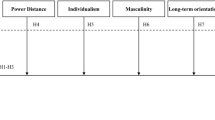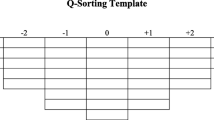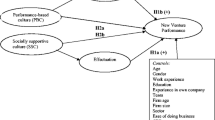Abstract
Although national culture is an important regulator of entrepreneurship, there is a dearth of studies that: (1) explore the effects of national cultural practices on entrepreneurial behaviors by individuals; (2) use appropriate multilevel research designs; (3) consider the effects of culture on different entrepreneurial behaviors, such as entry and post-entry growth aspirations. We combined Global Entrepreneurship Monitor (GEM) and Global Leadership and Organizational Behavior Effectiveness (GLOBE) data from 42 countries for 2005–2008 to address these gaps, using a multilevel design. We found societal institutional collectivism practices negatively associated with entrepreneurial entry, but positively associated with entrepreneurial growth aspirations. Uncertainty avoidance practices were negatively associated with entry but not with growth aspirations, and performance orientation practices were positively associated with entry. Our analysis highlights the differential effects of cultural practices on entrepreneurial entry and growth aspirations, and demonstrates the value of multilevel techniques in analyzing the effect of culture on entrepreneurship.
Similar content being viewed by others
References
Acs, Z.J., Autio, E., & Szerb, L. 2012. National systems of entrepreneurship: Measurement issues and policy implications. SSRN eLibrary, http://dx.doi.org/10.2139/ssrn.2008160.
Ajzen, I. 1991. The theory of planned behavior. Organizational Behavior and Human Decision Processes, 50 (2): 179–211.
Aldrich, H. E. 2009. Lost in space, out of time: How and why we should study organizations comparatively. In B. King, T. Felin, & D. Whetten (Eds), Studying differences between organizations: Comparative approaches to organizational research, Research in the Sociology of Organizations, Vol. 26, 21–44. Bingley: Emerald Group.
Ambos, B., & Schlegelmilch, B. 2008. Innovation in multinational firms: Does cultural fit enhance performance? Management International Review, 48 (2): 189–206.
Arenius, P., & Minniti, M. 2005. Perceptual variables and nascent entrepreneurship. Small Business Economics, 24 (3): 233–247.
Autio, E. 2007. Global entrepreneurship monitor: 2007 global report on high-growth entrepreneurship. London: GERA.
Autio, E., & Acs, Z. 2010. Intellectual property protection and the formation of entrepreneurial growth aspirations. Strategic Entrepreneurship Journal, 4 (3): 234–251.
Baker, T., Gedajlovic, T., & Lubatkin, M. 2005. A framework for comparing entrepreneurship processes across nations. Journal of International Business Studies, 36 (5): 492–504.
Bandura, A. 1986. Social foundations of thought and action: A social cognitive theory. Englewood Cliffs, NJ: Prentice-Hall.
Baumol, W. J. 1990. Entrepreneurship: Productive, unproductive, and destructive. Journal of Political Economy, 98 (5): 893–921.
Begley, T. M., & Tan, W. L. 2001. The socio-cultural environment for entrepreneurship: A comparison between East Asian and Anglo-Saxon countries. Journal of International Business Studies, 32 (3): 537–553.
Bosma, N., Acs, Z. J., Autio, E., Coduras, A., & Levie, J. 2009. Global entrepreneurship monitor 2008: Executive report. London: GERA.
Bowen, H. P., & De Clercq, D. 2008. Institutional context and the allocation of entrepreneurial effort. Journal of International Business Studies, 39 (4): 747–767.
Brewer, M. B., & Chen, Y.-R. 2007. Where (who) are collectives in collectivism? Toward conceptual clarification of individualism and collectivism. Psychological Review, 114 (1): 133–151.
Busenitz, L., West, G., Shepherd, D., Nelson, T., Chandler, G., & Zacharakis, A. 2003. Entrepreneurship research in emergence: Past trends and future directions. Journal of Management, 29 (3): 285–308.
Cassar, G. 2006. Entrepreneur opportunity costs and intended venture growth. Journal of Business Venturing, 21 (5): 610–632.
Cassar, G. 2007. Money, money, money? A longitudinal investigation of entrepreneur career reasons, growth preferences and achieved growth. Entrepreneurship and Regional Development, 19 (1): 89–107.
Cliff, J. 1998. Does one size fit all? Exploring the relationship between attitudes towards growth, gender, and business size. Journal of Business Venturing, 13 (6): 523–542.
Cullen, J. B., & Gordon, R. H. 2007. Taxes and entrepreneurial risk-taking: Theory and evidence for the US. Journal of Public Economics, 91 (7–8): 1479–1505.
Davidsson, P. 1991. Continued entrepreneurship: Ability, need, and opportunity as determinants of small firm growth. Journal of Business Venturing, 6 (6): 405–429.
Davidsson, P., & Wiklund, J. 2001. Levels of analysis in entrepreneurship research: Current practice and suggestions for the future. Entrepreneurship Theory and Practice, 25 (4): 81–99.
De Clercq, D., Danis, W. M., & Dakhli, M. 2010. The moderating effect of institutional context on the relationship between associational activity and new business activity in emerging economies. International Business Review, 19 (1): 85–101.
Delmar, F., & Wennberg, K. 2010. The birth, growth, and demise of entrepreneurial firms in the knowledge intensive economy. Cheltenham: Edward Elgar.
Delmar, F., & Wiklund, J. 2008. The effect of small business managers’ growth motivation on firm growth: A longitudinal study. Entrepreneurship Theory and Practice, 32 (3): 437–457.
Evesey, D., & Musgrave, R. A. 1944. Proportional income taxation and risk-taking. Quarterly Journal of Economics, 58 (3): 388–422.
Fairlie, R. W. 2002. Drug dealing and legitimate self-employment. Journal of Labor Economics, 20 (3): 538–567.
Freytag, A., & Thurik, R. 2007. Entrepreneurship and its determinants in a cross-country setting. Journal of Evolutionary Economics, 17 (2): 117–131.
Greif, A. 2001. Cultural beliefs and the organization of society. In A.C. Brinton & V. Nee (Eds), The new institutionalism in sociology: 77–104. Stanford, CA: Stanford University Press.
Guiso, L., Sapienza, P., & Zingales, L. 2006. Does culture affect economic outcomes? Journal of Economic Perspectives, 20 (2): 23–48.
Hanges, P. J., & Dickson, M. W. 2004. The development and validation of the GLOBE culture and leadership scales. In R. J. House, P. J. Hanges, M. Javidan, P. W. Dorfman, & V. Gupta (Eds), Culture, leadership, and organizations: The GLOBE study of 62 societies: 122–151. Thousand Oaks, CA: Sage.
Hansen, J., Deitz, G., Tokman, M., Marino, L., & Weaver, K. 2009. Cross-national invariance of the entrepreneurial orientation scale. Journal of Business Venturing, 26 (1): 61–78.
Hayton, J. C., George, G., & Zahra, S. A. 2002. National culture and entrepreneurship: A review of behavioral research. Entrepreneurship Theory and Practice, 26 (4): 33–52.
Henrekson, M. 2005. Entrepreneurship: A weak link in the welfare state? Industrial and Corporate Change, 14 (3): 437–467.
Hofmann, D. A., Griffin, M. A., & Gavin, M. B. 2000. The application of hierarchical linear modeling to organizational research. In K. J. Klein & S. W. J. Kozlowski (Eds), Multilevel theory, research, and methods in organizations: Foundations, extensions, and new directions: 467–511. San Francisco, CA: Jossey-Bass.
Hofstede, F. T., Wedel, M., & Steenkamp, J. B. E. M. 2002. Identifying spatial segments in international markets. Marketing Science, 21 (2): 160–177.
Hofstede, G. 2001. Culture's consequences: Comparing values, behaviors, institutions, and organizations across nations. Thousand Oaks, CA: Sage.
Hofstede, G. 2006. What did GLOBE really measure? Researchers’ minds versus respondents’ minds. Journal of International Business Studies, 37 (6): 882–896.
Hofstede, G., & Peterson, M. F. 2000. National culture and organizational culture. In N. Ashkanasy, C. Wilderom, & M. F. Peterson (Eds), Handbook of organizational culture and climate: 401–415. Thousand Oaks, CA: Sage.
House, R. J., & Javidan, M. 2004. Overview of GLOBE. In R. J. House, P. J. Hanges, M. Javidan, P. W. Dorfman, & V. Gupta (Eds), Culture, leadership, and organizations: The GLOBE study of 62 societies. Thousand Oaks: Sage.
House, R. J., Hanges, P. J., Javidan, M., Dorfman, P. W., & Gupta, V. (Eds) 2004. Culture, leadership, and organizations: The GLOBE study of 62 societies. Thousand Oaks, CA: Sage.
Javidan, M. 2004. Performance orientation. In R. J. House, P. J. Hanges, M. Javidan, P. W. Dorfman, & V. Gupta (Eds), Culture, leadership, and organizations: The GLOBE study of 62 societies: 235–281. Thousand Oaks, CA: Sage.
Javidan, M., House, R. J., Dorfman, P. W., Hanges, P. J., & De Luque, M. S. 2006. Conceptualizing and measuring cultures and their consequences: A comparative review of GLOBE's and Hofstede's approaches. Journal of International Business Studies, 37 (6): 897–914.
Johnson, J. P., & Lenartowicz, T. 1998. Culture, freedom and economic growth: Do cultural values explain economic growth? Journal of World Business, 33 (4): 332–356.
Kim, P. H., & Li, M. 2013. Seeking assurances when taking action: Legal systems, social trust, and starting businesses in emerging economies. Organization Studies, forthcoming.
Kim, P. H., Lee, C., & Reynolds, P. D. 2012. Backed by the state: Social protection and starting businesses in knowledge-intensive industries. In J. Katz & A. C. Corbett (Eds), Advances in entrepreneurship, firm emergence and growth, Vol. 14, 25–62. Bingley: Emerald Group.
Kirzner, I. M. 1997. Entrepreneurial discovery and the competitive market process: An Austrian approach. Journal of Economic Literature, 35 (1): 60–85.
Knight, F. H. 2002. Risk, uncertainty and profit. Washington, DC: Beard Books.
Kozlowski, S. W. J., & Klein, K. J. 2000. A multilevel approach to theory and research in organizations: Contextual, temporal, and emergent issues. In S. W. J. Kozlowski & K. J. Klein (Eds), Multilevel theory, research, and methods in organizations: Foundations, extensions, and new directions: 3–91. San Francisco, CA: Jossey-Bass.
Kreiser, P. M., Marino, L. D., Dickson, P., & Weaver, K. M. 2010. Cultural influences on entrepreneurial orientation: The impact of national culture on risk taking and proactiveness in SMEs. Entrepreneurship Theory and Practice, 34 (5): 959–983.
Kwok, C. C. Y., & Tadesse, S. 2006. National culture and financial systems. Journal of International Business Studies, 37 (2): 227–247.
Landier, A. 2005. Entrepreneurship and the stigma of failure. Available at SSRN: http://ssrn.com/abstract=850446.
Lee, S. M., & Peterson, S. J. 2000. Culture, entrepreneurial orientation, and global competitiveness. Journal of World Business, 35 (4): 401–416.
Lumpkin, G., & Dess, G. 1996. Clarifying the entrepreneurial orientation construct and linking it to performance. Academy of Management Review, 21 (1): 135–172.
Martin, K. D., Cullen, J. B., & Johnson, J. L. 2007. Deciding to bribe: A cross-level analysis of firm and home country influences on bribery activity. Academy of Management Journal, 50 (6): 1401–1422.
Maseland, R., & Van Hoorn, A. 2009. Explaining the negative correlation between values and practices: A note on the Hofstede–GLOBE debate. Journal of International Business Studies, 40 (3): 527–532.
McGrath, R. G., MacMillan, I. C., Yang, E. A.-Y., & Tsai, W. 1992. Does culture endure or is it malleable? Issues for entrepreneurial economic development. Journal of Business Venturing, 7 (6): 441–458.
McMullen, J. S., & Shepherd, D. A. 2006. Entrepreneurial action and the role of uncertainty in the theory of the entrepreneur. Academy of Management Review, 31 (1): 132–152.
Merton, R. K. 1936. The unanticipated consequences of purposive social action. American Sociological Review, 1 (6): 894–904.
Mueller, S. L., & Thomas, A. S. 2001. Culture and entrepreneurial potential: A nine country study of locus of control and innovativeness. Journal of Business Venturing, 16 (1): 51–75.
Nanda, R., & Sørensen, J. 2010. Workplace peers and entrepreneurship. Management Science, 56 (7): 1116–1126.
Oyserman, D., & Lee, S. W. S. 2008. Does culture influence what and how we think? Effects of priming individualism and collectivism. Psychological Bulletin, 134 (2): 311–342.
Oyserman, D., Coon, H. M., & Kemmelmeier, M. 2002. Rethinking individualism and collectivism: Evaluation of theoretical assumptions and meta-analyses. Psychological Bulletin, 128 (1): 3–72.
Peterson, M. F., & Castro, S. L. 2006. Measurement metrics at aggregate levels of analysis: Implications for organization culture research and the GLOBE project. The Leadership Quarterly, 17 (5): 506–521.
Peterson, M. F., Arregle, J.-L., & Xavier, M. 2012. Multilevel models in international business research. Journal of International Business Studies, 43 (5): 451–457.
Phan, P. 2004. Entrepreneurship theory: possibilities and future directions. Journal of Business Venturing, 19 (5): 617–620.
Podolny, J. M. 2005. Status signals: A sociological study of market competition. Princeton, NJ: Princeton University Press.
Rauch, A., & Frese, M. 2007. Let's put the person back into entrepreneurship research: A meta-analysis on the relationship between business owners’ personality traits, business creation, and success. European Journal of Work and Organizational Psychology, 16 (4): 353–385.
Rauch, A., Wiklund, J., Lumpkin, G., & Frese, M. 2009. Entrepreneurial orientation and business performance: An assessment of past research and suggestions for the future. Entrepreneurship Theory and Practice, 33 (3): 761–787.
Raudenbush, S. W. 1988. Educational applications of hierarchical linear models: A review. Journal of Educational Statistics, 13 (2): 85–116.
Raudenbush, S. W., & Bryk, A. 2008. HLM 6 hierarchical linear and nonlinear modeling software. Lincolnwood, IL: SSI Scientific Software International.
Reynolds, P. D. 2007. New firm creation in the United States: A PSED I overview. Foundations and Trends in Entrepreneurship, 3 (1): 1–150.
Reynolds, P., Bosma, N., Autio, E., Hunt, S., deBono, N., Servais, I., Lopez-Garcia, P., & Chin, N. 2005. Global entrepreneurship monitor: Data collection design and implementation 1998–2003. Small Business Economics, 24 (3): 205–231.
Robinson, W. S. 1950. Ecological correlations and the behavior of individuals. American Sociological Review, 15 (3): 351–357.
Sagie, A., & Elizur, D. 1999. Achievement motive and entrepreneurial orientation: A structural analysis. Journal of Organizational Behavior, 20 (3): 375–387.
Schumpeter, J. A. 1934. The theory of economic development: An inquiry into profits, capital, credit, interest, and the business cycle. Cambridge, MA: Harvard University Press.
Segall, M. H., Lonner, W. J., & Berry, J. W. 1998. Cross-cultural psychology as a scholarly discipline: On the flowering of culture in behavioral research. American Psychologist, 53 (10): 1101–1110.
Seligson, M. A. 2002. The renaissance of political culture or the renaissance of the ecological fallacy? Comparative Politics, 34 (3): 273–292.
Shane, S. 1993. Cultural influences on national rates of innovation. Journal of Business Venturing, 8 (1): 59–73.
Shepherd, D. A., McMullen, J. S., & Jennings, P. D. 2007. The formation of opportunity beliefs: Overcoming ignorance and reducing doubt. Strategic Entrepreneurship Journal, 1 (1–2): 75–95.
Smith, P. B., Peterson, M. F., & Thomason, S. P. & the Event Meaning Management Research Group 2011. National culture as moderator of the relationship between leaders’ use of guidance sources and how well work events are handled. Journal of Cross Cultural Psychology, 42 (6): 1103–1123.
Snijders, T. A. B., & Bosker, R. J. 2004. Multilevel analysis: An introduction to basic and advanced multilevel modeling. London: Sage.
Steensma, H. K., Marino, L., & Weaver, K. M. 2000. Attitudes toward cooperative strategies: A cross-cultural analysis of entrepreneurs. Journal of International Business Studies, 31 (4): 591–609.
Stel, A., Carree, M., & Thurik, R. 2005. The effect of entrepreneurial activity on national economic growth. Small Business Economics, 24 (3): 311–321.
Stephan, U., & Uhlaner, L. 2008. Societal legitimation: Cultural practices and entrepreneurship in 35 countries. International Journal of Psychology, 43 (3–4): 561–561.
Stephan, U., & Uhlaner, L. M. 2010. Performance-based vs socially supportive culture: A cross-national study of descriptive norms and entrepreneurship. Journal of International Business Studies, 41 (8): 1347–1364.
Stevenson, H. H., & Jarillo, J. C. 1990. A paradigm of entrepreneurship: Entrepreneurial management. Strategic Management Journal, 11 (Special Issue): 17–27.
Stinchcombe, A. L. 1965. Social structure and organizations. In J. G. March (Ed.), Handbook of organizations: 142–193. Chicago: Rand MacNally.
Taras, V., Rowney, J., & Steel, P. 2009. Half a century of measuring culture: Review of approaches, challenges, and limitations based on the analysis of 121 instruments for quantifying culture. Journal of International Management, 15 (4): 357–373.
Terjesen, S., Hessels, J., & Li, D. 2013. Comparative international entrepreneurship research: A review and research agenda. Journal of Management, forthcoming.
Thelen, K. A. 2004. How institutions evolve: The political economy of skills in Germany, Britain, the United States, and Japan. Cambridge: Cambridge University Press.
Thomas, A. S., & Mueller, S. L. 2000. A case for comparative entrepreneurship: Assessing the relevance of culture. Journal of International Business Studies, 31 (2): 287–301.
Tiessen, J. H. 1997. Individualism, collectivism, and entrepreneurship: A framework for international comparative research. Journal of Business Venturing, 12 (5): 367–384.
Uhlaner, L., & Thurik, R. 2007. Postmaterialism influencing total entrepreneurial activity across nations. Journal of Evolutionary Economics, 17 (2): 161–185.
Venaik, S., & Brewer, P. 2010. Avoiding uncertainty in Hofstede and GLOBE. Journal of International Business Studies, 41 (8): 1294–1315.
Wagner, J., & Sternberg, R. 2004. Start-up activities, individual characteristics, and the regional milieu: Lessons for entrepreneurship support policies from German micro data. Annals of Regional Science, 38 (2): 219–240.
Wennberg, K., Pathak, S., & Autio, E. 2013. How culture moulds the effects of self-efficacy and fear of failure for entrepreneurship, Working paper, Imperial College Business School.
Wennekers, S., Thurik, R., Van Stel, A., & Noorderhaven, N. 2007. Uncertainty avoidance and the rate of business ownership across 21 OECD countries, 1976–2004. Journal of Evolutionary Economics, 17 (2): 133–160.
Witt, M. A., & Redding, G. 2008. Culture, meaning, and institutions: Executive rationale in Germany and Japan. Journal of International Business Studies, 40 (45): 859–885.
Zhang, Z., & Arvey, R. D. 2009. Rule breaking in adolescence and entrepreneurial status: An empirical investigation. Journal of Business Venturing, 24 (5): 436–447.
Zhao, H., Seibert, S., & Hills, G. 2005. The mediating role of self-efficacy in the development of entrepreneurial intentions. Journal of Applied Psychology, 90 (6): 1265–1272.
Acknowledgements
We wish to thank the seminar participants at the Stockholm School of Economics, the 4th Global Entrepreneurship Research Conference held at Imperial College Business School, Patric Andersson, and Emre Yildiz for their comments and suggestions. We are especially grateful for the thoughtful and thorough comments provided by the special issue associate editor Mark F. Peterson and the three anonymous referees. Financial support from QinetiQ, EPSRC, and the Swedish Research Council is also gratefully acknowledged.
Author information
Authors and Affiliations
Additional information
Accepted by Mark Peterson, Consulting Editor, 6 March 2013. This paper has been with the authors for five revisions.
APPENDIX
APPENDIX
Individual-level Self-Efficacy
You have the knowledge, skill and experience required to start a new business: Yes (=1)/No (=0).
Individual-level Fear of Failure
Fear of failure would prevent you from starting a business: Yes (=1)/No (=0).
Rights and permissions
About this article
Cite this article
Autio, E., Pathak, S. & Wennberg, K. Consequences of cultural practices for entrepreneurial behaviors. J Int Bus Stud 44, 334–362 (2013). https://doi.org/10.1057/jibs.2013.15
Received:
Revised:
Accepted:
Published:
Issue Date:
DOI: https://doi.org/10.1057/jibs.2013.15




